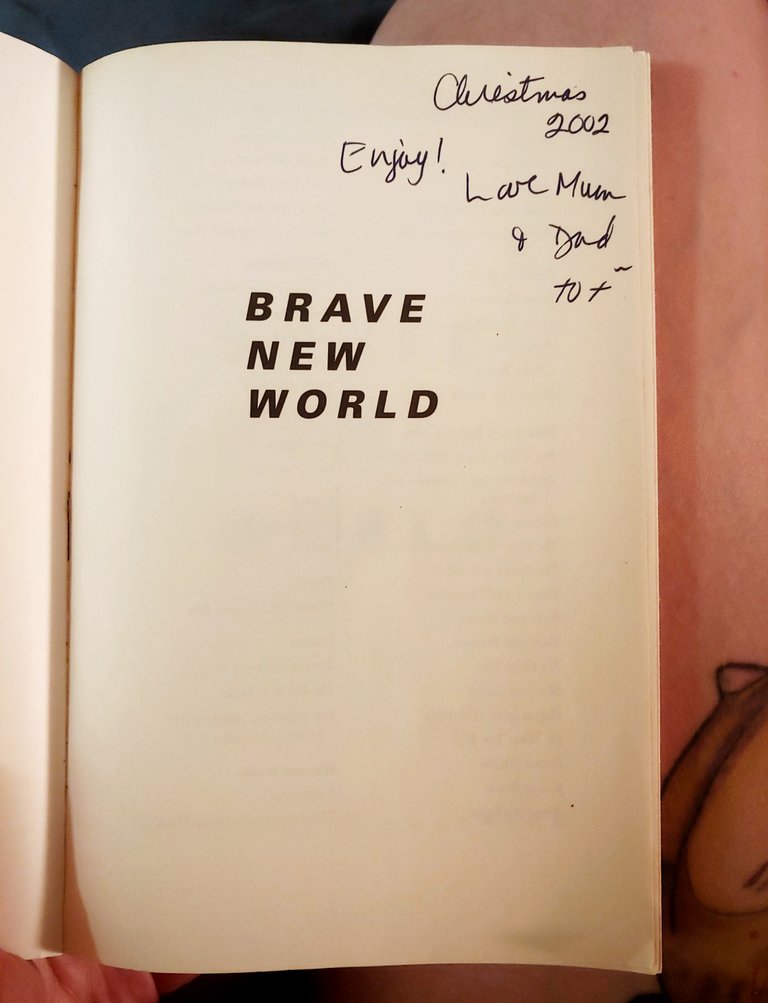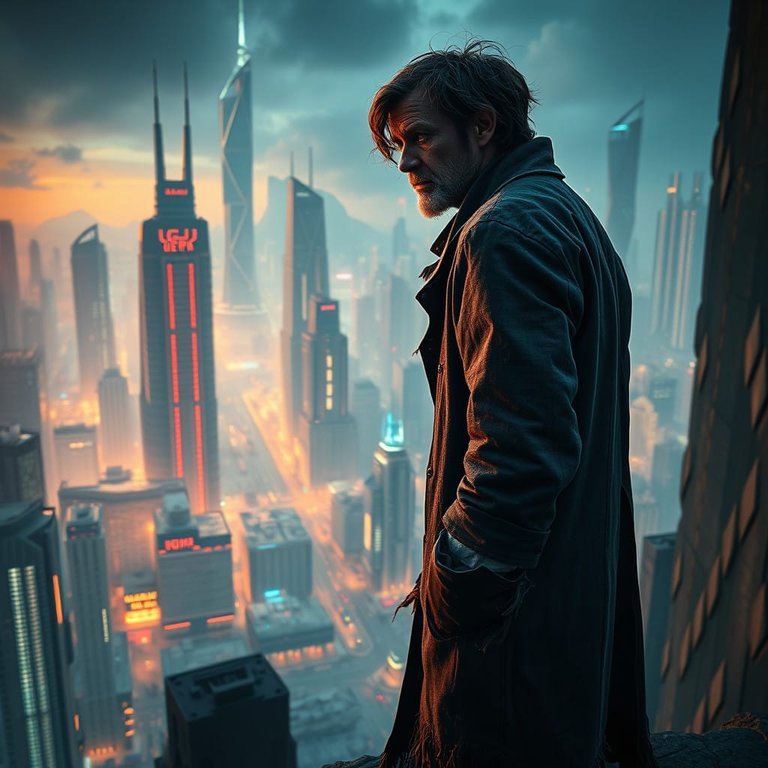The Characters in Brave New World
 (The note that was found in the copy of my book -- merry Christmas, everyone! 😀🎄)
(The note that was found in the copy of my book -- merry Christmas, everyone! 😀🎄)
This was my second time reading the novel Brave New World. The first time I had not paid enough attention to truly take in what an absolute masterpiece this book truly is. In fact, I would even go so far as to honor it with the greatest and most influential story of the last century.
For this post, I would like to break down some of the major characters in the book, starting with Bernard Marx.
When we first meet Bernard, we are hopeful for the opportunity of a more human protagonist, considering how robotic the rest of society is. He is the first character to start questioning the reality of his existence, the only one who feels out of place, but most importantly, one of the few to have independent thought.
"I am I, and I wish I wasn't; his self-consciousness was acute and distressing."
"'I'd rather be myself. ... Myself and nasty. Not somebody else, however jolly.'"
 (Image created using an AI art generator on Night Cafe)
(Image created using an AI art generator on Night Cafe)
Bernard is interesting, in the sense that he constantly breaks the fourth wall throughout the book. Bernard makes it known that he is aware of the social conditioning that takes place, he knows how it happens, and he even understands the affect that it has on people. It is this awareness that allows him to question reality in the first place.
'"What would it be like if I could, if I were free -- not enslaved by my conditioning.'"
However, the facade comes to an end once Bernard is treated as an Alpha for the first time in his life. He allows his status to go to his head, he becomes detestable, and his downfall is pitiful...
"Pierced by every word that was spoken, the tight balloon of Bernard's happy self-confidence was leaking from a thousand wounds."
"'Please give me another chance,' The tears began to flow. 'I tell you, it's their fault,' he sobbed."
In the end, not even Bernard is immune to grovelling and begging for his life, and if it means he can be spared, then he willingly tries to give up his friends.
The scene is quite reminiscent of Winston's downfall in 1984. We all would like to believe that we are exceptional people who can happily stand by what and who we believe in, no matter how many times the whipping rod comes down on us.
The reality is, it takes a very special kind of person to be capable of doing just that... and I believe that we see it with our next character, Helmholtz Watson.
Helmholtz Watson is a noteworthy character. When we are first introduced to him, we simply assume that he will be a background character throughout the novel, just someone whom Bernard can share his thoughts with...
In reality, I believe that Helmholtz is the true protagonist all along.
Similar to Bernard, Helmholtz deals with existential thoughts of his own. Yet, unlike Bernard, his thoughts have not manifested due to awareness. Helmholtz is a writer, and his thoughts stemmed from the very real human desire to create something beautiful.
"'Can you say something about nothing?'"
"'I feel ... as though I were just beginning to have something to write about.' ... In spite of all his troubles, he seemed ... profoundly happy."

I truly believe Helmholtz is the real hero. Unlike Bernard, Helmholtz has had the privilege of being treated as an Alpha his entire life. Bernard was unsatisfied with society due to his image as an outcast, but Helmholtz never faced that problem. He has had all of his wants and desires fulfilled, and has always been treated with respect throughout his life.
Despite this, the thoughts developed regardless. His occupation as a propagandist left something to be desired, but because of society's deprivation of beauty and art and religion, Helmholtz is unable to determine what it is.
"'Ford helps those who help themselves!' ... And suddenly there was Helmholtz at his side ... and in the interval also throwing the poison out by handfuls through the open window."
This scene at the hospital? absolutely tremendous 💋👌 Seeing Helmholtz rush in to join John, despite being aware of the consequences, was admirable. He accepts his punishment without complaint -- even laughs in the presence of the World Controller! Helmholtz stood by his beliefs, regardless of his conditioning and status in society. He is twice the man that Bernard is.
"In spite of their sadness -- because of it, even; for their sadness was the symptom of their love for one another -- the three young men were happy."
Of course, there is Lenina as well. Lenina is interesting because we finally get to see the effects of someone who is deprived of something -- someone -- that they want. Even with all of her conditioning and soma, Lenina experiences love, for John of all people, but is absolutely baffled by his societal upbringing and customs.
"Lenina sat in a corner, cut off from those who surrounded her by an emotion which they did not share."
"'I wanted ... to show I was worthy of you.' 'Why should you think it necessary...'"

By the end, I truly felt a sense of pity for Lenina. She only wanted to love John, but instead her emotions were used to manipulate her into becoming his whipping post. John's own love for Lenina causes him to recoil at his actions and is ultimately what leads to his suicide.
It is extremely unsettling to see the outcome of two people who truly did care for each other, become one another's kryptonite due to their inability to understand each other.
"The Savage had rushed at her like a madman. ... Terrified, she had turned to flee, had tripped and fallen in the heather. ... But her ruddy-faced companion had bolted out of harm's way behind the helicopter."
John is another character that you cannot help but feel immense pathos for. He was raised by a promiscuous mother, both of whom were tormented by others because of it, but neither of them understanding why it was happening. John had no one to raise or guide him, for he was brought up by an infantilized adult.
"'Alone, always alone. ... If one's different, one's bound to be lonely.'"
John went to civilized society due to the lies and illusions everyone fed him. His mother constantly assured him that "no one was ever lonely there," and Lenina gave him the illusion that everyone would be as marvellous as she appeared to be. He did not realize the horrors that awaited him in the other world, how he would end up further isolating himself.
"He was thinking of Lenina ... 'O brave new world.'"
So John ventures to the brave new world, where "everyone belongs to everyone else" and nothing is sacred. John becomes repulsed by this society's inability to commit or suffer. Ultimately his visit reveals that Lenina, the woman that he idolized, is just like everyone else and behaves like everyone else. There is nothing special about her and the novelty wears off.

"Obstinately the beautiful memories refused to rise; there was only a hateful resurrection of jealousies and uglinesses and miseries."
The hospital scene with Linda breaks my heart, for I finally realized how truly alone John was. Linda had always commented that John was "a comfort to her." She had been just as isolated as he, yet that is all that he was to her -- just a selfish means to an end, which was comforting Linda of her loneliness. Despite this, John still attempts to recall happy memories with his mother and defend her, only for Linda to greet his presence with a disturbed reaction. John truly had no one.
"She knew him for John, her son, but fancied him an intruder into that paradise where she had been spending her soma-holiday with Popé."
Of course he tries to save others, which is admirable, but John's want for peace is when we can truly connect with him. Having had enough of people, John attempts to live away from everyone else, but his need for suffering is what draws everyone back to him, for society has never been exposed to anything like it before. Once he realizes that he will never be left alone, John takes matters into his own hands.

I definitely need to read this book because of how you described it. It seems so interesting how the characters are developed, I have to give it a try!